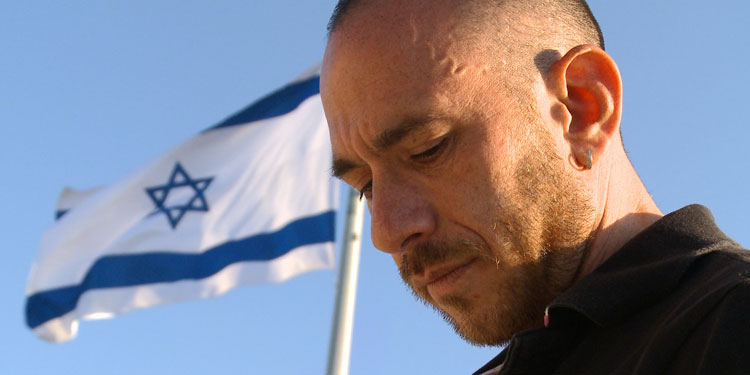
Director: Barak Heymann, Tomer Heymann
Running Time: 85 min
Certificate: NR
Release Date: November 12th 2016 (UK Jewish Film Festival)

This documentary is about Saar, who was born in Israel but has spent the last 17 years living in London. He’s gay, HIV+ and a member of the London Gay Men’s Chorus. He also has a rather complicated relationship with his family, who didn’t react well to finding out he was gay, or that he was HIV+. While they have been improved over the years, there are still lots of issues to deal with.
The film follows him as he deals with some of those issues, including when first his mother and then his father come to visit, and he returns to see them and his six siblings in Israel. It reveals a complex portrait and a rather sad one, of a man who seems to feel rather dislocated from everything he grew up and has created his own family in London, but still feels like something is missing in his life.
As well as following Saar himself, filmmakers Barak Heymann and Tomer Heymann get a surprising amount of access to his family while he’s not around. It’s almost surprising they agreed, as they must have known there was a decent chance they wouldn’t come off in a particularly positive light, especially when they’re talking about Saar’s irresponsibility and being pretty unsympathetic to his situation, which just ends up highlighting Saar’s seemingly unfair isolation. There’s a recurring theme of many people in Saar’s family blaming him for their discomfort, their lack of understanding and their attitudes, rather than thinking that perhaps it’s them who are the bigger part of the problem.
Although most of his family are religiously conservative Jews – something Saar backed away from when he was young – the film is keen to point out it’s not purely religion that’s the problem, but ignorance and a tendency to decide things are someone else’s fault rather than looking at whether they have any culpability of their own. That’s compounded by the fact Saar isn’t around them most of the time, allowing them to reinforce each other’s prejudices, and also that like many families, no one is keen to challenge the more unpleasant voices. However, the film doesn’t sit in judgement and proclaim them all as bigoted asses, instead allowing them to speak for themselves, even while it suggest Saar is essentially in a bit of a self-imposed exile.
It does do a good job though of showing that for all of them, it’s a process. Saar’s mother talks about her changing thoughts and attitudes, and how she still struggles with her son’s HIV status. That’s partly because the family tend to have rather outdated views, such as Saar’s brother suggesting he thinks his children could catch HIV just by being around their uncle a lot, or his parents still feeling that Saar is living with a death sentence hanging over him, despite the strides made in treating the virus. The film also suggests though that Saar has a bit of culpability for not standing up for himself more, perhaps stemming from the guilt he feels both over his diagnosis and for not being the son his rather didactic father wanted.
Click here to watch the trailer for Who’s Gonna Love Me Now?
Indeed, the relationship with his father is rather fascinating, largely because his dad is one of those people who often talks more like he’s given a lecture or sermon than having a conversation, and what he has to say about family, responsibility and what’s important in life often appears to actively – but perhaps unwittingly – try and shut Saar out. Indeed, he seems to treat his child’s thoughts and feeling as not being serious, purely because they don’t fit with his worldview. However, the documentary shows that he too is on a journey and may be beginning to realise how his words and attitudes have affected his son.
Although there is a lot of sadness and loneliness in the documentary, there’s also a sense of hope, as Saar begins to evaluate his life and decides perhaps he needs to make a few changes, both to change his relationship with his family and to take charge of his own happiness and make peace with himself. It helps ensure it’s a fairly absorbing film, with Saar being a very empathetic centre around its exploration of family, sexuality, religion and taking control of your own truth.
Overall Verdict: Not always a happy watch, but it’s not surprising Who’s Gonna Love Me Now? Has won film festival awards, as it’s a surprisingly engrossing look into a man in virtual exile, and his and his family’s journey to a new understanding.
Reviewer: Tim Isaac
The UK International Jewish Film Festival takes place in London and various other cities across the UK on 5th – 20th November. Who’s Gonna Love Me Now screens on November 12th.
Leave a Reply (if comment does not appear immediately, it may have been held for moderation)